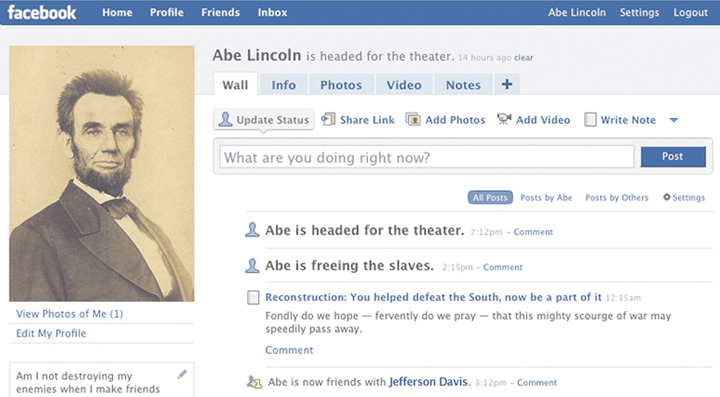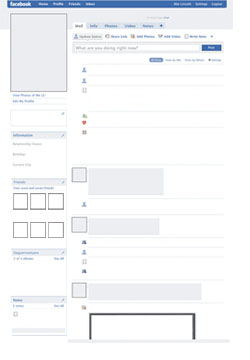

Last week Jane Bozarth and Cammy Bean posted a terrific parody of what Abraham Lincoln’s Facebook page might look like. While Lincoln’s Facebook template is well-done and humorous, it also serves as a history refresher by including popular, and lesser-known facts, about Lincoln.
For example, are you familiar with all the references in the page:

Did you know Lincoln took on the town bully in a wrestling match and won both the match as well as the respect of the town?

I love this one. It’s a great summary and partly explains why Lee turned down Lincoln’s offer to lead the Union.

I don’t remember learning about Joshua Speed when I went to school, but he’s certainly part of Lincoln history today.
![]()

And of course this famous quote refers to Lincoln’s unwillingness to emancipate the slaves.

Lincoln’s depression was well documented.
Okay, so you get the point. Rather than listing Lincoln’s history in a page or two in a text book, the information is presented using multiple voices, perspectives and formats. It’s more of a conversation than a history book, yet it’s the same information one would expect on a mid-term.
How great would it be for teachers to have similar platforms in their schools to use for educational role play? Teachers could use the pages to engage their students on any subject while using a medium familiar and engaging to students.
Teachers could set up their own Facebook pages for course topics and assume the “voice” of the page, while students interact with the teacher through the application.
Using the Lincoln example, the teacher would role play as Lincoln, posting comments, quotes and status updates while students would “wall-to-wall” and interact with the teacher through the page .
This is already done in most online classes using Blackboard where students are required to post two or more replies to other students’ posts. The difference here is the content is presented in a more creative modality than a Blackboard thread.
In this model, students create and maintain their own page for research topics. The topic could be a historical person, similar to the Lincoln example, or it could anthropomorphize a place or event such as a country, product, economic policy and so on.
Students could also interact with each other’s “pages” and grades could be based on anything from participation to quality of posts.

I get it – most schools won’t have access to their own Facebook technology, or won’t feel comfortable using the live Facebook for classes.
But that doesn’t mean creative teachers couldn’t create generic Facebook activity sheets for students.
I ran the Lincoln example through my Photoshop sanitizer (rectangular marquee and foreground fill) to create an empty, blank Facebook page.
A possible assignment could be to complete the worksheet for a historical event or person using content learned in class or researched on their own.
After a period of time, students could exchange their work with each other and continue the assignment.
What would they include on the blank worksheets?
Students could be asked to provide content from multiple perspectives such as:
Or maybe I’m over-thinking all of this and it’s really just a creative parody?